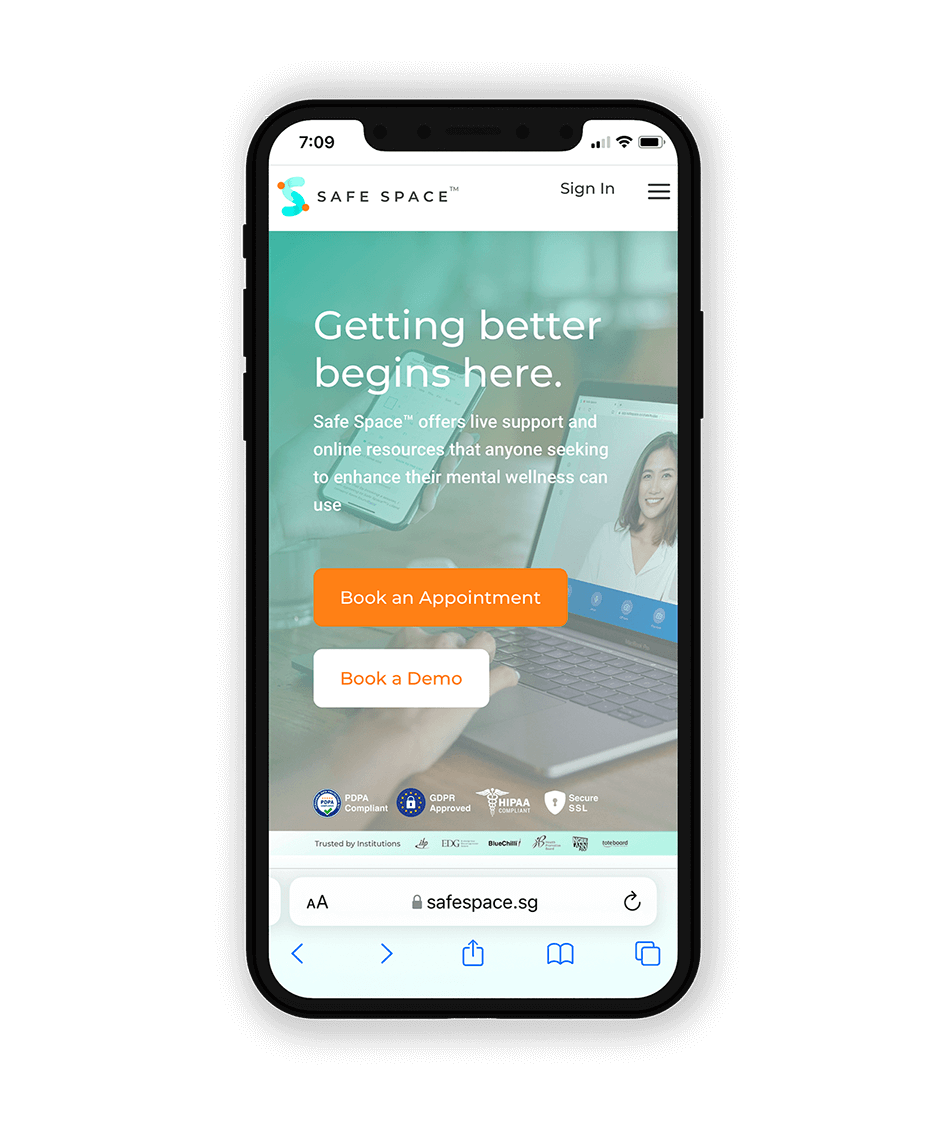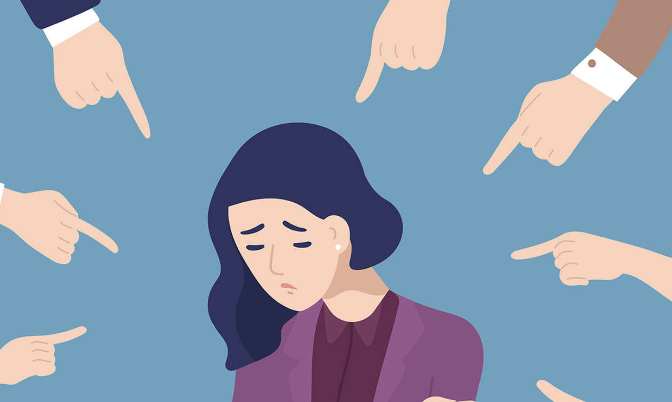Social media has become an integral part of our daily lives. We spend hours scrolling through social feeds, only to feel more anxious and depressed about what we see. And with this, collated worldwide research shows social media can be harmful to mental health mainly because it creates social comparison—the need to compare your life with others’ lives. Additionally, the openness in social media has made it a breeding ground for bullying, abuse, and other forms of negativity.
Nevertheless, social media is just one piece of the puzzle when it comes to tackling our mental health. Experts are not asking everyone to quit social media entirely. However, The way you use social media can have a significant impact on how you feel mentally.
This Safe Space™ RESOURCE will discuss the effects of social media on our mental health and what steps you can take to be the driver of the “tool” instead of being its slave.
Social Media’s Part in Our Mental Well-being

Social comparison is a social media problem that results in making us feel insecure and angry at ourselves. We tend to compare our lives with others by focusing on the positive things we see on our feeds while disregarding their negative traits or characteristics. Even if you think social comparisons are all benign because there’s no real impact from it, recent research shows otherwise—social comparison can lead to depression and anxiety.
According to a 2017 Canadian study, students who use social media for more than two hours a day are more likely to acquire mental health issues. Another mental health issue brought upon by social media use is cyberbullying and abuse, which has become an epidemic among millennials aged 18-24 years old (in which 26% of girls said they had suicidal thoughts).
The rise in widespread access to technology has made bullying easier than ever before: over half of teenagers have been bullied online, and social media is the number one reason for this.
Self-esteem is built through positive effects like strong social networks/support groups that provide quality relationships with family and friends both online and offline; this will boost self-worth rather than feelings of depression, anxiety, insecurity.
These negative effects might not be as prevalent if the time spent using social media is appropriately regulated.
Do not let it become an activity you do all day long. Make sure your phone is only a tool for entertainment during set periods throughout the day rather it becoming an addiction.
Most people who have negative experiences around social media constantly check feeds or spend hours glued to their screens throughout the day. However, social networking sites should never take away from valuable real-life social interactions or social support.
Social media can be a great tool when used correctly to create positive social interactions and relationships, but it might take time to adjust your social networking habits.
Using Social Media To Your Advantage
When you use social media with a positive mindset, it can benefit your mental health. For example, one study found that social comparisons made people feel better about themselves by motivating them to work harder. Social media can also help create social support networks, increase self-esteem, and offer opportunities for fun experiences, so long as these interactions are not based solely on appearance or shallow relationships.
As we mentioned before, the social comparison may backfire, but studies show that using social networking sites in moderation has no adverse effects on our mental well-being.
To get the most out of social media without feeling depressed or anxious, it is important to socialize with real friends and family instead of just looking at strangers’ lives. Also, make sure that social media doesn’t take up too much space in your life. Social comparisons shouldn’t be the reason why you are checking social feeds constantly or spending hours glued to your phone/computer screen.
Remember: social comparison is inevitable because people like to put their best foot forward on social media (the most attractive photos, the most remarkable accomplishments), but this does not mean everything they post about should make you feel insecure or unworthy. You can still compare yourself with others by using social networks as a tool for learning rather than using these feeds as a way to compare what’s “lacking” in yourself.
Focus on Relationships Instead of the Curated Imagery
Social networking sites should give you social support networks by providing a place to build quality relationships with your friends and family. However, these platforms should not be tools for you to create impractical expectations of yourself. Understand that authentic relationships are more critical than curated feeds. In addition, it can be fun or even therapeutic if you find social media pages that make you feel good about yourself rather than poorly.
By all means, use social networking sites as much as possible, but remember to keep it in balance. Make sure the time spent on social media does not take away from valuable face-to-face interactions (with real people). Selfies and other forms of social comparison should only be used when needed for self-promotion purposes like promoting your latest work/business transaction. Don’t let them become an everyday activity because this could lead to depression, anxiety, and loneliness over time.
Overall, social media is an inevitable part of life these days, so make sure how you use it doesn’t have adverse effects on your mental well being or social comparisons that lead to depression, anxiety etc.
Make sure that there are mixed social networks where people focus mainly on fun rather than appearance (shallow self-esteem) by limiting how much time is spent online each day and trying not to let it replace real-world relationships too!
Learning from what we see will help us understand others better while still appreciating our uniqueness as individuals.
If you choose to, social media can also be positive for mental health. For example, one study found that social support provided through social networking sites (SNS) may improve well-being. In addition, the researchers believe that social platforms can be helpful because they present opportunities to maintain or establish new relationships, which positively contribute to our sense of belongingness and self-esteem.

What You Can Do To Improve Your Own Social Media Experience
Here are a few things you can do to make your social experience less harmful:
Control Your Time
Reduce social media consumption. Make yourself a daily or weekly time limit and stick to it! You can also log off from social networks every once in a while, especially on days where you feel your mental well being is at risk. You can also customize the time spent on social media with your mobile phone’s app restrictions.
Place More Value on Real-life Relationships
Try not to compare yourself with everyone who appears perfect online. It’s the people good at social media who do this the best! Remember, everybody’s human, and whatever facade we display on social media, we have our challenges.
Be A Mindful Contributor
Be careful about what kind of content you share online because it may contribute to social comparisons or feelings of envy. Also, keep in mind that their algorithms design your social feeds to make you feel a certain way. Usually, getting more likes will only inflate your ego without making anyone truly happy.
You might also try changing how often you post from weekdays when there is less activity on social networks than at weekends. And finally, don’t forget about yourself when scrolling through your feed. Pay attention to what makes YOU feel bad/good inside rather than projecting those emotions onto others. This tip is especially crucial for social media influencers who may feel pressured to consistently act or look their best online.
You can also try social mindfulness, which means becoming more aware of your social interactions and experiences by paying attention to how you use social networks (you can read about it here).
Summary
Scientists worldwide are still pursuing discoveries around the connection between social media and our mental health. Meanwhile, remember that there is no harm in putting down your phone every once in a while if you want some peace of mind. So enjoy your digital detox and allow yourself to get bored.
Also, know that you have the capacity to change how these platforms evolve by being a mindful contributor, focusing on positivity, self-love and empathy.



